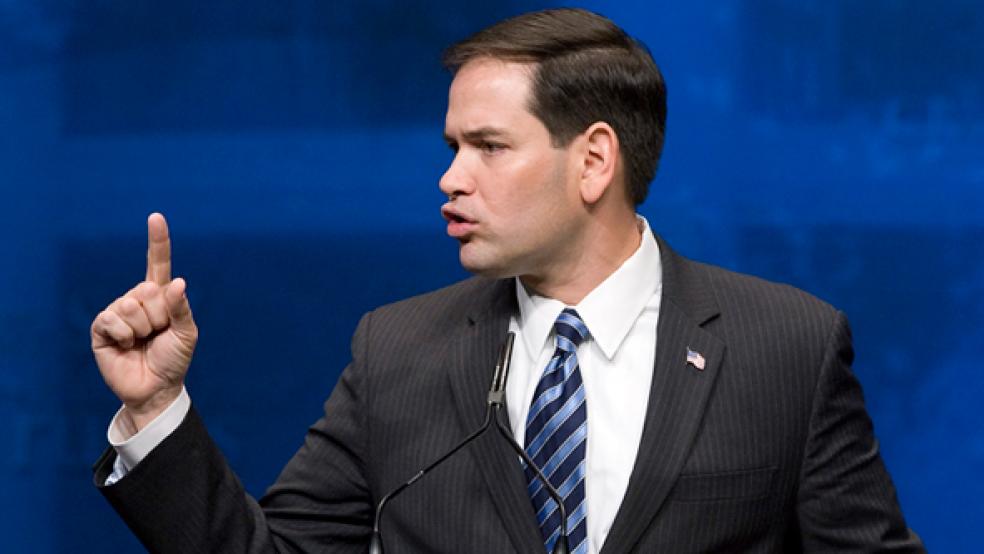With his third place finish in the Iowa caucuses, Marco Rubio appears poised to claim the mantle of the "serious" Republican candidate in 2016. So now might be a good time to discuss that Rubio wants to do something that is, even by GOP standards, rather wild: He wants to scrap all taxes on interest, dividends, and capital gains from stocks.
This means he wants to get rid of all taxes on income from wealth ownership, and only tax income from labor — i.e. wages.
Related: How Rubio’s Debate Stumble Could Derail Him as the ‘Establishment Candidate’
His reasons are based on a simple philosophy held by many economists, including many liberal ones: Our tax system should encourage investment. Dividends and capital gains and interest are income people earn on stocks and bonds that they own. Stocks and bonds, in turn, are investment: When they're bought, that money allows business and individuals to create new capital, like office space and computers and tractors and roads. It enlarges the economy's total capacity to do productive stuff.
"My father had a job as a bartender at a hotel. And the reason why he had a job as a bartender is because someone with money invested in that hotel," Rubio said, in an interview with CNBC's John Harwood. "That’s why he had a salary, and that’s why he had tips."
"Anything you tax, you’re gonna get less of," Rubio continued. "We want more investment. Why would we tax it?"
If Rubio's plan seems like a massive sop to the wealthy, it is. Ownership of stocks and bonds and other forms of wealth is already massively skewed towards the rich, and dividends and capital gains were the biggest driver of growing inequality from 1996 to 2006. Short-term capital gains (profit earned by selling stock you've held for less than a year) are subject to the normal income tax, as are certain dividends. But other dividends and long-term capital gains are taxed at a special low rate of 23.8 percent, precisely because of this argument for privileging investment. (The Republicans cut it all the way to 15 percent in 2003, until a deal with Obama hiked it again in 2013.)
Related: Marco Rubio Calls for a Constitutional Convention—That’s Problematic
By dropping all these rates to zero, Rubio would be shoveling a massive amount of money up the income ladder. Rubio's plan includes other tax cuts as well, and all told it would deprive the federal government of $6 trillion in revenue over a decade of operation. We can run higher deficits than we do now, but there are limits, and more money for the Mitt Romneys and Donald Trumps of the world isn't exactly the best use of them. Not to mention Rubio and the GOP would seek to close the budget gap by slashing aid programs for the poorest and least fortunate Americans.
But what of Rubio's core thesis? Normal income taxes on wages from work are effectively taxes on consumption, since our income from our jobs is what we consume with. So if capital gains and dividends and so forth are income from investment, and we want to privilege investment, shouldn't we tax that less?
Actually, no. And Rubio's story about his father helps illuminate why. Investment may have created the hotel where his father worked, but it didn't put the hotel to use. After new capacity is created, it's entirely possible for it to lie unused. When that happens throughout the economy, there's mass unemployment, wages collapse, and livelihoods stagnate.
What puts the hotel or any other form of capital to use is consumption: People come to the hotel and rent rooms, and stroll up to the bar and buy drinks and food and drop bills in the tip jar for guys like Rubio Senior. When the amount of consumption — i.e. aggregate demand — is high enough to use all our capacity, we've got full employment. Workers have choices for where to work and power over their circumstances. Wages rise and people flourish.
Saying we should privilege investment way over consumption is like saying it's more important to build hotels than to encourage people to spend money in them. In fact, if you look at the last few decades, we've chronically fallen short of hitting full employment. Meanwhile, it's basically impossible to find any historical evidence that changes in capital gains taxes improve economic growth.
If anything, it's our consumption we need to be bulking up.
This article originally appeared on The Week.Read more from The Week:
How Chris Christie exposed Marco Rubio as an untrustworthy pretender
Hillary Clinton's campaign is reportedly unhappy with Hillary Clinton
Michael Bloomberg confirms he's considering a presidential run



